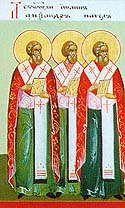Alexander of Constantinople
Alexander of Constantinople | |
|---|---|
| Bishop of Byzantium and Archbishop of Constantinople | |
 Icon of Patriarchs Alexander, John and Paul IV | |
| Installed | 314 |
| Term ended | 337 |
| Personal details | |
| Born | 237–245 |
| Died | 337 Constantinople |
| Denomination | Eastern Christianity |
| Sainthood | |
| Feast day |
|
| Venerated in | Roman Catholicism |
Alexander of Constantinople (Greek: Ἀλέξανδρος; c. 237/245 – 337) was a bishop of Byzantium and the first Archbishop of Constantinople[1] (the city was renamed during his episcopacy). Scholars consider most of the available information on Alexander to be legendary.[2]
Origin and early life
This article may need to be rewritten to comply with Wikipedia's quality standards. (October 2019) |
According to the
Alexander was elected as a
During his episcopacy, Alexander engaged in debate with
Arian controversy
When the Arian controversy began, Alexander, the Patriarch of Alexandria, requested his cooperation in combatting what he perceived to be heresy.[8] According to most sources, Alexander of Constantinople was present at the First Council of Nicaea[9] as Metrophanes' deputy, although some sources state that Metrophanes (who would have been 117 years of age at the time) attended the council personally. At the council, Arius and his teachings were condemned.
Later,
Death
Alexander did not long survive Arius.[12] On his deathbed he was said to have nominated his vicar, Paul, as his successor, and to have warned his clergy against Macedonius, who became bishop of Constantinople in 342 and whose teachings inspired Macedonianism.
After his death, Alexander came to be regarded as a saint of the Church. The service in his honor was printed in
Notes
- ^ Smith 1911 cites Theodoret Hist. i. 19
- ISBN 978-0-19-504652-6. Retrieved 2018-07-25.
- ^ See Canon iii, First Council of Constantinople, 359 AD
- Socrates Scholasticus Hist. ii. 6; SozomenHist. iii. 3
- ^ Smith 1911 cites Gregory Nazianzus, Oration 27
- ^ Smith 1911 cites Epiphanius of Cyprus, Adv. Haer. lxix. 10
- ^ Smith 1911 cites Theodoret, Hist. i. 3, cf. Phil. 12
- ^ Smith 1911 cites Theodoret, op. cit. i. 4
- ^ Smith 1911 citesSozomen, op. cit. ii. 29
- ^ Smith 1911 cites Athanasius of Alexandria Ep. ad Serap.; Rufinus, Hist. i.
- ^ Smith 1911 cites Socrates Scholasticus, op. cit. i. 37
- ^ Smith 1911 cites Socrates Scholasticus, op. cit. ii. 6 ; Theodoret, op. cit.i. 19
References
 This article incorporates text from a publication now in the public domain: Smith, I. G. (1911). "Alexander, of Byzantium". In Wace, Henry; Piercy, William C. (eds.). Dictionary of Christian Biography and Literature to the End of the Sixth Century (3rd ed.). London: John Murray.
This article incorporates text from a publication now in the public domain: Smith, I. G. (1911). "Alexander, of Byzantium". In Wace, Henry; Piercy, William C. (eds.). Dictionary of Christian Biography and Literature to the End of the Sixth Century (3rd ed.). London: John Murray.
External links
- St Alexander the Patriarch of Constantinople Orthodox Synaxarion
